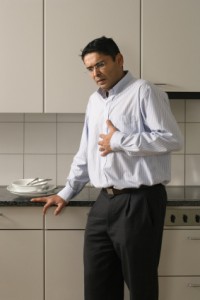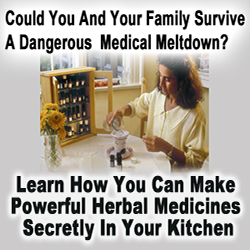There is no single pill or remedy that cures acid reflux (also called Gastroesophageal Reflux Disease or GERD). It is a condition that develops with time and lifestyle choices.
 The most recognized symptom of acid reflux is a persistent burning sensation in the mid-chest region and/or throat. This is brought on when stomach acid churns, coming up the esophagus and pushing through lower esophageal sphincter. Sometimes it comes up as far as the back of the throat and mouth.
The most recognized symptom of acid reflux is a persistent burning sensation in the mid-chest region and/or throat. This is brought on when stomach acid churns, coming up the esophagus and pushing through lower esophageal sphincter. Sometimes it comes up as far as the back of the throat and mouth.
Just as there is no single cure for this condition, there is also no single cause. A malfunction of the lower esophageal sphincter can ultimately lead to GERD. Those who suffer with GERD usually have terrible heartburn two or more days per week. This is very serious in the long term; the escaping stomach acid can erode the lining of the esophagus. This can cause scar tissue, swallowing problems, and, in some cases, esophageal cancer. Some have had acid reflux with out the heartburn. When this happens, symptoms can include wheezing, coarseness in the throat, breathing problems, chest pain, dry coughing, bad breath, bitter taste in the mouth, and disturbed sleep.
Common causes of reflux and heartburn can include:
- Alcohol consumption
- Smoking
- Greasy, fried, and fatty foods
- Eating large meals
- Eating before going to bed
- Higher hormone levels while pregnant
- Stress
- Some sedatives and antidepressants
- Slower emptying of stomach contents
- Consuming large amounts of carbonated beverages
- Scleroderma, mixed connective tissue disease, hiatal hernia, and other diseases that weaken esophageal muscles
If you suffer from this disorder, you should try avoiding some foods to see if this helps you.
- Fruit – lemons, tomatoes, and tomato products
- Juice – orange, cranberry, grapefruit, and lemonade
- Vegetables – raw onion, french fries, and mashed potatoes
- Meat Products – ground beef, chicken nuggets, buffalo wings, and marbled sirloin
- Dairy Products – cottage cheese, sour cream, ice cream, and milk shakes
- Grains – pasta with sauces and macaroni and cheese
- Beverages – wine, liquor, coffee (decaffeinated or regular), and black tea
- Salads/Sweets – creamy salad dressing, oil and vinegar dressing, high fat butter cookies, chocolate, doughnuts, corn chips, and brownies
Safe Foods:
- Fruit – apples (fresh, dried, and juice) and bananas
- Veggies – broccoli, carrots, cabbage, peas, green beans, and baked potatoes
- Meat Products – skinless chicken, extra lean ground beef, London broil, steak, eggs, and fat-free fish
- Dairy – fat-free cream cheese, goat cheese, low-fat soy cheese, and fat-free sour cream
- Grains – brown or white rice, multi-grain or whole-wheat bread, cereal (bran or oatmeal), corn bread, graham crackers, pretzels, and rice cakes
- Beverages – mineral water
- Salad/Sweets – low fat salad dressing, fat-free cookies, jelly beans, red licorice, and baked potato chips
Interesting dietary facts:
- Drinking milk before bed can’t prevent reflux. It actually causes a rebound action and increases acid production.
- All beverages, especially beer, have the ability to double stomach acid.
- Eating an alkaline diet may help you overcome the effects of reflux.
Remedies:
- Baking soda – one teaspoon in a cup of water
- Swedish bitter – a tonic made of thirteen detoxifying herbs
- Apple cider vinegar – one teaspoon in a cup of water (make sure it is organic, living vinegar with the “mother” in it)
- Almonds – chew a few almonds upon waking and after each meal. Chew them very well (the longer the better)—in a short time, you will see relief in your symptoms.
- Chamomile, fennel, or mint tea – sip it slowly, taking your time. If it is to help, this will increase the likeliness of it helping.
- Apple – eating an organic apple after your meals can help keep symptoms in check. Slowly chewing them to a fine pulp before swallowing to help reduce acid.
- Ginger – whether raw, candied, or powdered (shaken or in capsules) can be a great acid reducer.
- Chewing gum – this is a great aid to digestion and also stimulates saliva production. This works in much the same way as drinking water, as it dilutes stomach acid and limits symptoms.
Treatments:
Again there is no absolute cure for reflux, but there are many ways you can choose from to assist in reducing symptoms.
- Lifestyle changes – speaking to your healthcare provider for ways to change some of the things you currently do may lead you to real help for your symptoms.
- Natural remedies – those that are listed above and others you can find on the Internet can really improve your reflux.
- OTC remedies – there are many, and one or more may work for you.
- Prescriptions – if none of the above has helped, you may find a prescription drug to help.
- Surgery – when nothing else has helped, you may need to go to this extreme to get the relief you need.
It is always best to start off with the small cures, and then gradually move up the ladder from one to the next until you find the help you need. Changes in lifestyle cost nothing but time. The next rung up the ladder would be the herbal and natural remedies, then the over-the-counter remedies. Prescriptions would be the final rung before seeking surgery to end your symptoms. It is just like following a road map. Remember: never try any of the things mentioned here without seeking the advice of your healthcare provider.
Good health to ALL!
©2011 Off the Grid News
 Off The Grid News Better Ideas For Off The Grid Living
Off The Grid News Better Ideas For Off The Grid Living





